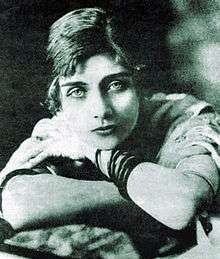Teresa Wilms Montt

María Teresa de las Mercedes Wilms Montt (8 September 1893 – 24 December 1921; pseudonyms Tebal and Teresa de la Cruz) was a Chilean writer, poet, and anarcha-feminist. Described as "embodying sexual aberrance and social prophesy",[1] she was a friend of the writers Ramón Gómez de la Serna, Enrique Gómez Carrillo, Joaquín Edwards Bello, Víctor Domingo Silva, and Ramón Valle-Inclán.
Biography
A scion of the Montt family, she was born in Viña del Mar, Chile, to Luz Victoria Montt y Montt and Federico Guillermo Wilms y Brieba. She was the couple's second daughter, and she had seven sisters. Educated by governesses and private tutors,[2] she married Gustavo Balmaceda Valdés at the age of 17, against the will of her family. They had two children, Elisa "Chita" (1911) and Sylvia Luz (1913).[3]
In Santiago, she joined the city's active cultural life.
Between 1912 and 1915, they resided in Iquique because of her husband's work.[4] It was here that she began her relationship with feminists, trade unionists, and even Masons,[5] and became associated with nascent reformist movements. She used the pseudonym Tebal when she was first published in the Iquique newspaper.[6] After her husband returned to Santiago, he discovered the affair which Wilms Montt had with his cousin, Vicente Zañartu Balmaceda. Because of it, the men of the Balmaceda Valdés family held a 'family court' in 1915, and decided Wilms Montt's punishment would be to spend time at the Convento de la Preciosa Sangre.[7] Here, she kept a diary and, depressed, made her first suicide attempt on March 29, 1916.[3]
In June 1916, Vicente Huidobro helped her escape from the convent and she fled with him to Buenos Aires.[8] The city's cosmopolitan intellectual circle had a positive effect on her, she became acquaintance with writers Victoria Ocampo, Jorge Borges, and feminist-fashionista "Pele" Pelegrina Pastorino. The following year, she published Inquietudes Sentimentales, which was followed by Los Tres Cantos, where she explored eroticism and spirituality. After an admirer, Horacio Ramos Mejía, committed suicide in Wilms Montt's home, she left for New York City during World War I, but, after being accused of being a German spy, she was deported to Spain.[3][9] Here, she became the muse of Julio Romero de Torres, who introduced her to the writers Gómez de la Serna, Gómez Carrillo, and Ramón Valle-Inclán. In Madrid, using the pseudonym Teresa de la Cruz, she published "En la Quietud del Mármol" and "Anuarí".[10][11] Her travels took her to London and París, but she resided in Madrid. She was reunited with her daughters in Paris in 1920 after 5 years of separation through the efforts of her father, who was on a diplomatic mission.[3] However, the pain of separating from them again when they returned to Chile led to a terrible depression.[3]
She committed suicide at the Hotel Laenaec in Paris on December 24, 1921, from an overdose of Veronal at the age of 28 years.[12] Her life is remembered in the 2009 film Teresa: Crucificada por amar by director Tatiana Gaviola.[3][13]
Gallery
 Teresa Wilms Montt
Teresa Wilms Montt Teresa Wilms Montt (1914)
Teresa Wilms Montt (1914) Portrait of Teresa Wilms Montt, by Julio Romero de Torres
Portrait of Teresa Wilms Montt, by Julio Romero de Torres Portrait of Teresa Wilms Montt, by Julio Romero de Torres
Portrait of Teresa Wilms Montt, by Julio Romero de Torres
References
- ↑ Richards, Keith John (20 July 2011). Themes in Latin American Cinema: A Critical Survey. McFarland. p. 181. ISBN 978-0-7864-8918-3.
- ↑ Marcas identitarias (in Spanish). Editorial Cuarto Propio. p. 97. ISBN 978-956-260-392-8.
- 1 2 3 4 5 6 "Narran la Historia de la Escritora Teresa Wilms Montt". Chile.com. Retrieved 1 October 2014.
- ↑ Subercaseaux, Bernardo (1 January 1997). Historia de las ideas y de la cultura en Chile (in Spanish). Editorial Universitaria. p. 109. ISBN 978-956-11-1707-5.
- ↑ Gazmuri R., Cristián (11 January 2012). Histografía chilena (1842–1970) II. Penguin Random House Grupo Editorial Chile. pp. 267–. ISBN 978-956-347-127-4.
- ↑ Steenhuis, Aafke (2007). La travesía del salitre chileno: de la pampa a la tierra holandesa (in Spanish). LOM Ediciones. p. 46. ISBN 978-956-282-942-7.
- ↑ May, Catalina (21 June 2009). "La encantadora aristócrata que se pasó a su clase por la raja". The Clinic. Retrieved 2 October 2014.
- ↑ González-Vergara, Ruth (1 January 1993). Teresa Wilms Montt: un canto de libertad : biografía (in Spanish). Grijalbo. p. 122.
- ↑ Garlitz, Virginia Milner. "The Last Muse of the Marqués de Bradomín ?". elpasajero.com. Retrieved 2 October 2014.
- ↑ "También para ellos" (PDF). letrasdechile.cl (in Spanish). p. 11. Retrieved 2 October 2014.
- ↑ "Cuentos para los hombres que son todavía niños [microform] (1919)". Bs. Aires : Otero & Co. Retrieved 2 October 2014.
- ↑ Lamperein, Lina Vera; Vieira, Ana María; Molina, Paz (2008). Presencia femenina en la literatura nacional: una trayectoria apasionante, 1750-2005 (in Spanish). Editorial Semejanza. p. 80. ISBN 978-956-7590-46-9.
- ↑ "Teresa: Crucificada por amar". IMDb. Retrieved 2 October 2014.
External links
- Teresa Wilms Montt @ Memoria Chilena, Biblioteca Nacional de Chile